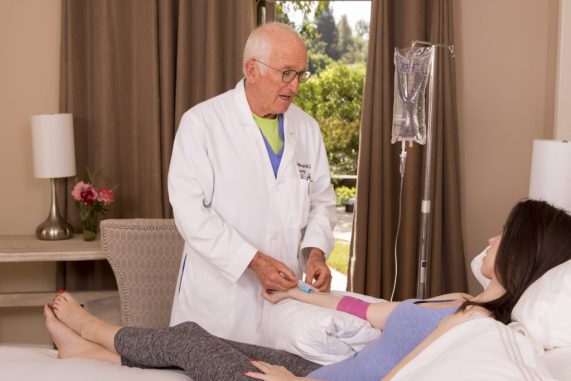Novo Detox is a treatment center with a detox and inpatient rehab facility in Los Angeles, fully accredited by The Joint Commission, the California Department of Health Care Services, and the Substance Abuse and Mental Health Services Administration (SAMHSA).
We are the best detox and rehab center for addiction for Atlanta, Georgia residents because we have a full staff of caring and empathetic, dedicated experts available to our patients 24 hours a day, 365 days a year. Our drug and alcohol detox and rehabilitation programs have a high recovery rating, with our patients avoiding the ping-pong effect.
Our Gallery
Why patients choose detox & rehab programs at Novo?
Focus on safety & comfort
24/7 supervised detox
Top Rated facility
Effective treatment
Healthy meals
Quick admissions
Evidence-based Therapy
Great locations Nationwide
- Rehab Near Me: Best Detox & Rehab Center for Addiction for Atlanta Residents
- Highest Rated Alcohol Detox Program
- Drug Detox Program
- Top Alcohol Rehab for Atlanta Residents
- Drug Rehab for Atlanta Residents
- How Much Does Rehab Cost in Atlanta?
- How Long Is Detox?
- How Long Is Rehab?
- Additional Therapies & Addiction Treatments Available
- Dual Diagnosis Treatment
- Does My Insurance Have Coverage For Rehab?
- Why Choose Novo Detox?
- Recovery Friendly Things to Do in Atlanta
- City Neighborhoods We Serve
Rehab Near Me: Best Detox & Rehab Center for Addiction for Atlanta Residents
Novo Detox offers a full range of addiction programs and treatments. Our rehab center treats clients addicted to alcohol, illicit drugs, and prescription drugs with programs like medical detox, inpatient treatment, outpatient treatment, and aftercare support. We offer conventional, evidence-based therapies and some alternative and holistic treatments known to support lasting recovery. Novo Detox is fully accredited by the Joint Commission and is renowned for its caring, individualized treatment. If you are struggling with addiction in or near Atlanta, you can get the help you need at our rehab to put drugs or alcohol behind you and achieve the recovery you crave.

Highest Rated Alcohol Detox Program
A person with an alcohol use disorder generally needs to detox before they can begin therapy for their addiction. Medical detox allows the alcohol toxins to be removed from the body. At Novo Detox, we offer detox programs. Our clinicians monitor clients and provide treatments to reduce the severity of withdrawal symptoms. Our detox center is renowned for its supportive environment and clinical excellence. We help clients rest and relax as their bodies become ‘clean.’ Once detox is completed, clients can move on to the next phase of their rehab plan.
Drug Detox Program
During drug detox at Novo Detox, clients slowly become weaned off the drug they’ve been addicted to. As people are aware, detox involves withdrawal symptoms. As these can be unpleasant, our clinicians provide effective treatments to reduce or eliminate them, helping clients to relax comfortably. Detox usually prefaces the rehab process. After the drug toxins are removed from the body, clients can focus on the subsequent treatments that help them manage their triggers. Detox only helps clients overcome physical dependency. Other therapies help them to address the powerful psychological and behavioral aspects of their addiction
Top Alcohol Rehab for Atlanta Residents
Novo Detox offers inpatient and outpatient alcohol rehab programs. Many clients enroll in both–first inpatient and then outpatient. Others choose one or the other. At Novo Detox, we offer flexible treatment programs because each client is different and has unique needs and preferences. Inpatient alcohol rehab is ideal for unstable clients at high risk for relapse. Outpatient therapy is ideal for clients with a degree of stability that allows them to remain at home. Which alcohol treatment plan is best for you? Our addiction specialists will help you find the right course of treatment for your needs and circumstances.
Drug Rehab for Atlanta Residents
Atlanta drug rehab provides clients with the support they need to put addiction behind them. Whether you are addicted to a prescription drug like Xanax or Hydrocodone or an illicit drug like heroin or cocaine, you can find help at Novo Detox. We offer many treatments during rehab as part of our inpatient and outpatient drug treatment programs. We help clients identify the unhealthy thoughts/behaviors that underlie their addiction and then to find strategies for managing them.
How Much Does Rehab Cost in Atlanta?
The cost of alcohol and drug rehab in Atlanta varies. Generally, inpatient rehab costs more than outpatient rehab because of the level of service offered. During residential treatment, clients have access to 24/7 support and lodging costs. Outpatient treatment involves the cost of treatment. How much a person pays for rehab also depends on their insurance coverage. If you are concerned about treatment costs, get in touch with Novo Detox so we can help you determine the cost of your plan. Addiction treatment is a compelling investment in one’s health and future. In fact, addiction treatment is a necessity. For many, recovery is not possible without it.
How Long Is Detox?
Alcohol and drug detox usually lasts between 5 to 10 days. Some people require less time to detox, but these individuals generally have not been addicted for long. Withdrawal symptoms tend to peak between 24 to 72 hours from the person’s last use of their addictive substance. After the peak, individuals then begin to feel better, but the weaning process takes time to complete. After about a week, individuals feel better–well enough to begin their rehab treatment plan. The length of time it takes a person to complete the detox process depends on how long they’ve been addicted, the substance they’re addicted to if they have multiple addictions, and their unique chemistry.
How Long Is Rehab?
The amount of time a person spends in rehab depends on their needs. Some people complete their rehab treatment milestones in 30 days. Others need more time. Many clients attend inpatient treatment and then transition to outpatient therapy. Fortunately, there are many flexible treatment options for people today. Access to inpatient and outpatient treatment plans allows clients in Atlanta to more easily access the treatment they need for as long as they need it.
30 Day Short Term Rehab
Clients may benefit from short-term rehab that involves 30-day plans. Generally, 30 days of rehab treatment is the minimum needed to learn to effectively manage a substance addiction. These programs are ideal for clients who are highly motivated to succeed. Even so, clients need to include aftercare in their long-term recovery plan. If short-term rehab isn’t enough time for you to reach your treatment milestones, adding additional time to your plan makes the best therapeutic sense.
Long-Term Rehab 60 – 90 Days
Many clients enroll in long-term rehab programs with 60 – 90 days plans. Long-term plans help clients build a strong recovery foundation. It takes time to learn to manage one’s triggers. Rehab offers clients a supportive environment where they can make changes to support relapse prevention. A person who has been addicted for years is addicted to more than one substance or has a dual diagnosis can benefit greatly by spending longer time enrolled in a formal rehab program.
Additional Therapies & Addiction Treatments Available
Novo Detox features a wide range of evidence-based, alternative, and holistic treatments. Together, these therapies address the many different aspects of alcohol and drug addiction. Evidence-based treatments include therapies such as cognitive behavioral therapy and rational emotive behavioral therapy. These treatments have been approved by the medical community for their effectiveness and safety. We also offer therapies such as art therapy, nutrition, and yoga, which have been known to enhance overall mental and physical health and recovery.
MAT
Medication-assisted treatment, or MAT, can be an effective form of addiction treatment for certain types of substance use disorders. MAT is used to treat opioid use disorder and alcohol use disorder. Clinicians prescribe certain medications to individuals with these addictions to block powerful cravings for the substance in question and ward off withdrawal symptoms. These drugs do not cause a high. They represent a safer drug option for the client to use while they are learning how to manage their addiction. Some clients require MAT for a short period of time, while others may need this therapy for longer. Novo Detox offers MAT because it’s safe and has been known to effectively support recovery in conjunction with a comprehensive addiction treatment plan.
Cognitive Behavioral Therapy (CBT)
Cognitive Behavioral Therapy (CBT) is a form of psychotherapy. During CBT treatment sessions, therapists will help clients begin to understand how their feelings and thoughts are connected to their behaviors–and can govern their behaviors if left unchecked. Working together, therapists and each client will develop strategies for changing unhealthy thoughts and feelings to support healthier behavior outcomes. CBT is an evidence-based therapy that’s highly effective for the treatment of drug and alcohol addiction.
Dialectical Behavioral Therapy (DBT)
Dialectical behavioral therapy (DBT) puts a strong focus on distress tolerance. Often stressful situations and their discomfort trigger drug or alcohol abuse. With DBT, clients learn ways to become more comfortable in stressful situations. Managing their discomfort effectively leaves them less vulnerable to relapse. Novo Detox offers DBT in conjunction with other medically sanctioned addiction therapies.
Rational Emotive Behavioral Therapy (REBT)
Similar to CBT and DBT, Rational Emotive Behavioral Therapy (REBT) specifically targets clients’ unhealthy thoughts and feelings. Because these thoughts and feelings are closely tied to unhealthy behaviors, therapists help clients to challenge them. For instance, feeling worthless is an unhealthy emotion that can compel a person to drink or use drugs to self-soothe. By challenging and changing that unhealthy self-perception, clients will be less inclined to drink or use drugs.
EMDR
EMDR stands for eye movement desensitization and reprocessing. Though relatively new in the pantheon of treatments for emotional trauma, EMDR has become increasingly popular as the news of its efficacy grows. During EMDR, a therapist guides clients to make certain eye movements while asking them questions about their past trauma. This method ‘moves’ the memories associated with the trauma to a different place in the brain. The movement allows clients to cope with past events with less difficulty. Clients who have been diagnosed with post-traumatic stress disorder or other stress-related disorders may benefit from EMDR.
Relapse Prevention
Relapse rates with many times of substances like alcohol, methamphetamine, and opioids are high. Moreover, some individuals face circumstances that leave them more vulnerable to relapse. Individuals who are at an elevated risk of relapse can benefit by attending relapse prevention therapy. Although all treatments have some relapse prevention component, this type of therapy strongly focuses on preventing relapse. Clients learn to identify the various stages of relapse and develop strategies for coping with their triggers.
Life Skills Training
Some clients find that they are deficient in certain life skills either because they never learned them or have been out of practice with them for some time. After all, addiction disrupts one’s life profoundly. Life skills training addresses the skills that clients need to create a healthy, well-structured life. Clients learn how to set goals, manage their home life, and acquire skills that support time management.
Vocational Training
Many substance use sufferers have lost their jobs or want to change careers. Vocational training provides many clients the support to obtain employment and lead a self-reliant life. Vocational training counselors can help clients craft resumes, learn how to communicate effectively in job interviews, and acquire basic job skills. Many rehabs offer some degree of vocational training as the need can be great. A good job can help form a strong recovery foundation.
Group Therapy
Group therapy involves a trained therapist and a group of people in recovery. Group therapy often forms the core of both inpatient and outpatient treatment programs. Clients and their peers can benefit from mutual support as they learn about their condition and various ways to manage it. Group therapy differs from individual therapy in that the addiction management and recovery topics are more general and, as such, relatable to all members of the group. Individual therapy allows clients to work on issues that are unique/personal to themselves.
Experiential Therapy
Experiential therapy offers some alternatives to traditional ‘talk therapy’ sessions. Talk therapy sessions are important, but many clients benefit from engaging in experiences that support recovery. Art therapy, for instance, is a form of experiential treatment that allows clients to express themselves through art. Some rehabs might organize a group hike as a form of experiential therapy. Not all clients feel comfortable or are adept at verbally expressing themselves and their feelings. Experiential therapy offers alternative ways to communicate and heal.
One-on-One Therapy
One-on-one therapy is a core element of Novo Detox rehab programs. Clients in inpatient and outpatient treatment programs will meet with therapists for one-on-one therapy sessions. During these sessions, clients can address personal issues or issues that are unique to their circumstances. They will learn how to specifically manage their unique triggers to abuse drugs or alcohol and get support for managing issues in their life. Together with group therapy, individual therapy forms part of a sound addiction treatment program. Clients can expect both group and one-on-one therapy at Novo Detox.
Family Therapy
The families of people addicted to alcohol or drugs can suffer too. A high-quality rehab like Novo Detox will offer family therapy for the entire family unit. During these sessions, therapists help each family member learn about addiction and how to provide healthy support for their loved one. They’ll get help coping with the issues associated with their loved one’s addiction. By treating the whole family, therapists can improve their communication for improved connections.
Trauma-Informed Therapy (After PTSD)
Drug and alcohol addiction often masks considerable emotional tumult and pain. People who have experienced trauma are at increased risk for drinking or using drugs. Drug and alcohol abuse, of course, heightens one’s risk of developing an addiction. Various forms of treatment take trauma into account. Clinicians need to address trauma when it triggers drug or alcohol abuse. Unresolved trauma can remain a powerful trigger to use drugs or alcohol. Consequently, trauma-informed therapy has become an important aspect of a comprehensive addiction treatment program.
Physical Fitness
Everyone can benefit from some level of physical fitness. Not only does an individualized fitness plan benefit one’s physical health, but it also supports mental health. As clients know, drug and alcohol addiction takes a toll on both mental and physical health. Physical fitness activities like walking or swimming can support the body’s natural healing processes. After fitness sessions, clients report feeling good physically and mentally. This is because exercise triggers the body’s endorphins to spur healing. At Novo Detox, we encourage clients to make physical fitness part of their long-term recovery plan. Routine exercise can be an effective relapse prevention strategy.
Off-Site Activities
During drug and alcohol rehab in Atlanta, clients spend a good deal of their time in treatment sessions, either individual or group therapy. But clients also need to relax and unwind. In addition to downtime when clients can rest or enjoy the rehab’s amenities, they may also be encouraged to participate in off-site activities. Rehabs like Novo Detox often organize group outings to area plays, films, or special events. The activities give clients a break from their treatment routine and allow them to engage with other clients. Getting back out into the world just for a bit can help them feel connected to the world at large and less isolated in their condition. In short, these activities can provide clients with a lot of fun and the opportunity to de-stress, supporting recovery.
12-Step Rehab for Atlanta Residents
Some clients find 12-step programs to be highly supportive of addiction recovery. Novo Detox features 12-step principles to acquaint clients with how these programs work. After completing rehab, clients are encouraged to attend 12-step programming like AA or NA in Atlanta as part of their aftercare plan. Although 12-step programs do not provide as formal treatment as an addiction treatment center can, they do offer a high degree of support and recovery structure for individuals. Aftercare is an important part of the long-term recovery process.
Dual Diagnosis Treatment
Substance abuse and mental health disorders often go hand in glove. About one-third of people with a drug or alcohol addiction also have a mental illness such as depression, post-traumatic stress disorder, or bipolar disorder. Both conditions can negatively impact the other, which is why dual diagnosis treatment involves simultaneous treatment is crucial. Novo Detox offers dual diagnosis treatment. Our clinicians help clients manage both of their conditions through many different therapies, including medication and various forms of psychotherapy.
Anxiety Disorder
Anxiety refers to a condition that involves intense worry or panic. People with anxiety disorders find it difficult to manage their worries. Anxiety is a common part of dual diagnosis. Anxiety can result after a person abuses drugs and alcohol for a period of time. Conversely, a person with an anxiety disorder might turn to drugs and alcohol to soothe their symptoms. Getting dual diagnosis treatment is the best way to manage anxiety and addiction when they present together. Clients often manage anxiety with therapy and medication.
Bipolar Disorder
Bipolar disorder is characterized by mood extremes, specifically its manic phase and depression phase. Someone with this disorder may experience deep depression for months. Depression may be followed by a period of intense energy. During the manic phase, individuals may become extremely social but also unpredictable. Many people engage in risk-taking activities during this period. The disorder can impact a person’s relationships and other important aspects of their life. Treatment often includes medication and psychotherapy.
Borderline Personality Disorder
Clients diagnosed with borderline personality disorder can get support at Novo Detox. This condition is often characterized by difficulty managing emotions and behaviors. People with this disorder often struggle to maintain stable relationships. They tend to have self-image problems and suffer from severe mood swings. Borderline personality can present as a dual diagnosis. The best way to treat this disorder is with psychological treatment. Some people benefit from medications depending on their symptoms.
Codependency
Codependency is a term that is frequently used to describe an unhealthy relationship. Codependent relationships are characterized by one individual’s need and another’s need to be needed. These relationships may be abusive or emotionally destructive. An example of a codependent relationship is when one spouse covers for the drug use or alcoholism of another. They might make excuses for their partner’s heavy drinking rather than encouraging them to take accountability for their drinking–and to get help if it becomes a problem. Therapists work with codependent individuals/couples to help them recognize their codependent tendencies and change them into healthier ways of relating and behaving.
Depression
Depression is a mental health condition that affects many people throughout the world. One in six people can expect to go through at least one bout of clinical depression during their life. This mental health condition is characterized by feelings of sadness and hopelessness. Some people experience suicidal thoughts. It’s not uncommon for depression to accompany alcohol and drug addiction. Depression can cause people to self-medicate with drugs and alcohol, but drug and alcohol abuse can also change the brain’s chemistry, paving the way for a mental illness like depression to set in. Treatment for depression generally includes medication like antidepressants and psychotherapy.
Impulse Control Disorder
There are various types of impulse control disorders. Kleptomania, for instance, is an impulse control disorder that compels people to take things that don’t belong to them. The disorder prevents individuals from maintaining self-control. Instead, they feel powerful compulsions or impulses to engage in what are, typically, unhealthy or destructive behaviors. Treatment involves helping clients identify the problematic thoughts that often trigger these behaviors. Other forms of therapy and medication can help clients manage this condition, which often presents with substance use disorders.
Post-Traumatic Stress Disorder
Post-traumatic stress disorder affects individuals who have witnessed or experienced traumatic events. Experiencing a single episode of chronic abuse as a child can cause PTSD. Certain occupations increase the risks of developing this condition. For instance, soldiers, firefighters, and police have a high incidence of PTSD. Treatment involves trauma-informed therapy and, often, medications. PTSD can be managed, but treatment is crucial. Many people with this disorder also have substance abuse problems. The clinicians at Novo Detox support clients who have PTSD and forms of alcohol or drug addictions with the best treatments available for dual diagnosis.
Does My Insurance Have Coverage For Rehab?
Medical insurance plans today have a legislative mandate to provide some level of coverage for addiction treatment and mental health treatment. Although some insurance plans may meet minimum coverage thresholds, others far exceed the minimum with their outstanding level of treatment coverage. The insurance specialists at Novo Detox can help you determine what your health insurance plan covers.
Why Choose Novo Detox?
People choose Novo Detox for addiction treatment because we offer a full continuum of care. In addition to our alcohol and drug detox programs, we feature inpatient and outpatient rehab. Some clients enroll in residential therapy and later, when they’ve grown in stability, they transition to outpatient treatment. Some people enroll in outpatient treatment from the start. Our flexible treatment plans are designed to help clients wherever they happen to be in their recovery process. Our clinicians are known for their empathetic care and our facility is designed with comfort in mind.
Our therapy plans include individualized treatment that targets each aspect of substance addiction. We help clients build a strong recovery foundation by providing them with the tools and resources they need to make lasting changes in their lives. Our rehab provides a full continuum of care and offers a wide range of therapies. We also offer world-class amenities in a safe, positive setting. If you are struggling with addiction in Atlanta, you can get the support you need to achieve long-term recovery at Novo Detox. Call or visit us to learn more.
Recovery Friendly Things to Do in Atlanta
To support your ongoing recovery, it’s helpful to find sober-friendly attractions and activities to enjoy. Fortunately, Atlanta has no shortage of these. Keep the following options in mind as you return to your everyday life after rehab and continue your recovery progress:
Atlanta Botanical Garden
The Atlanta Botanical Garden boasts a beautiful, serene setting filled with towering trees, formal garden beds, and specialty gardens. Its Japanese garden, orchid house, and rose garden are some of its highlights. A stroll through the gardens is a great way to de-stress and enjoy the outdoors. The garden also frequently hosts special events for the public.
Fox Theater
Built in the 1920s, Fox Theater is on the National Registry of Historic Places. The theater features a wide range of performances including musical concerts, ballet, opera, and, of course, theater productions of both classic and modern plays and musicals. The theater has been restored over the years to its Art Deco opulence.
Georgia Aquarium
Visitors of all ages love the Georgia Aquarium, a state-of-the-art aquarium that’s one of the largest in the world. The aquarium is home to more than 100,000 aquatic animals that represent locations from around the globe. Some of the creatures on display include sharks, sea lions, Beluga whales, penguins, and alligators.
Piedmont Park
As Atlanta’s oldest and largest park, Piedmont Park attracts many visitors who come to enjoy its lovely green space. The park features an oval running track that offers great city views. Visitors will also find gardens, historic landmarks, and an aquatic center at the park. This is a great option if you’re looking for a scenic place to walk or relax outdoors with a book.
Fernbank Museum of Natural History
The Fernbank Museum of Natural History offers visitors a unique cultural experience with its Great Hall of dinosaur skeletons and world-class exhibits. The museum features exhibits of both local and global cultures and landscapes. Visitors can look forward to special exhibitions and other features like its 3D theater.
Ponce City Market
Ponce City Market is located in an old Sears warehouse. Within, visitors will find throngs of shops, cafes, and restaurants. One of the most popular features of the marketplace is its rooftop coffee cafe with relaxing patio-style seating and frequent entertainment.
City Neighborhoods We Serve
Novo Detox services residents of Atlanta neighborhoods, including the following:
- Downtown Atlanta
- Castleberry Hill
- Sherwood Forest
- Oakland
- Peachtree Center
- Ashview Heights
- Summerhill
- Lakewood
- Grant Park
- Edgewood
- Five Points
- Midtown
- Ansley Park
- Sweet Auburn
- Inman Park
- Adamsville
- Capitol View
- Greenbriar
- Dixie Hills
- Riverside
- Chastain Park
- Pine Hills
- Brookwood
- Peachtree Park
- Loring Heights and more










